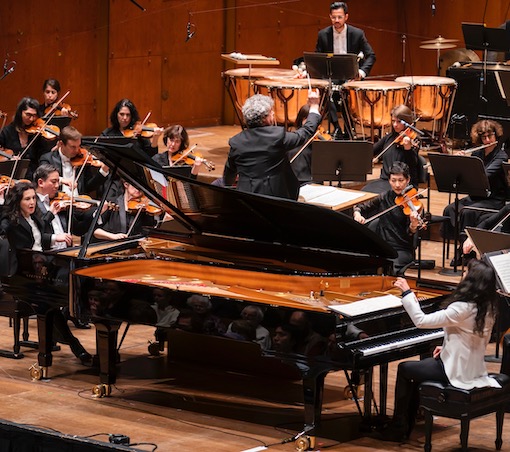A bracing Dessner concerto and freshly vital Rachmaninoff from Bychkov, Philharmonic

Just as the Rachmaninoff anniversary year was winding to a close, along came Semyon Bychkov and the New York Philharmonic with two powerful reminders of why this composer matters so much to us: the local premiere of an engaging concerto for two pianos and orchestra by Bryce Dessner, and a thrilling performance of Rachmaninoff’s very last composition, Symphonic Dances.
On paper, Friday afternoon’s concert at David Geffen Hall traced an arc from heedless youth in pursuit of erotic adventure (Strauss’s Don Juan) to the late Rachmaninoff piece that has evoked, in less successful performances, a line from T.S. Eliot: “thoughts of a dry brain in a dry season.”
Bychkov and his players complicated that picture with, on the one hand, a driven Don colored by melancholy self-awareness, and, on the other, a Rachmaninoff so blazingly vital as to banish all thoughts of old age.
In between, the piano duo of Katia and Marielle Labèque, going strong more than 50 years into their performing career, teamed up with a youngish composer who is literally a rock star in Dessner’s Two-Piano Concerto, a concise piece of Rachmaninoff-like athleticism, with nods toward Les Six, Prokofiev, and Philip Glass. (Glass also composed a concerto for the Labèques, which sounds nothing like this one.)
In the subtitle to Don Juan, “Tone Poem after Nikolaus Lenau,” Strauss made clear that this Don was not Mozart’s merry rogue or Byron’s satirical observer, but the tragic Romantic hero of Lenau’s poem, compelled to seek transcendent sensation, aware of the damage he’s causing, resigned to his eventual fate.
Strauss’s paean to sensuality sounded a little undernourished at first in Geffen’s clinical acoustic, but one came to appreciate Bychkov’s insistence on crisp rhythms when driving the music forward, and his understanding that every amorous encounter has its own tone and mood, sensitively characterized in this performance. Darker thoughts intruded in places, culminating in the exhaustion and desolation of the piece’s final pages.
Like Don Juan, Dessner’s concerto—composed in 2017, and presented here in a “reduced” 2020 version—opened in a burst of activity, only to back off to a murmur of woodwinds. Thereafter, the ever-changing textures and moods assured that the piece, in three distinct movements but lasting only about 20 minutes, wouldn’t wear out its welcome.
With two massive pianos forming a sort of orchestra of their own, and the composer often using his orchestral forces sparingly, the traditional David vs. Goliath concerto dynamic was replaced with something more collaborative, where even the pianists’ flying fingers, their evanescent chords and hammer blows in the bass, seemed less about displaying their prowess than about contributing to the overall soundscape.
But prowess there was anyway, in playing as colorful and delightful as the pianists’ matching metallic-striped gowns. The composer’s never-ending quest for novel, percussion-spiced orchestral textures completed the picture.
Again, on paper, the program seemed to follow a conventional pattern: the shock of the new followed, after intermission, by the comfort of the old. And here again, Bychkov and his band had other ideas.
Something about the sight and sound of those slashing down-bows that launched the Symphonic Dances alerted the listener that this would be no ordinary performance. One was buoyed along by chugging rhythms that felt both headlong and right in time. Even the quiet interludes seemed to leap off the page, discovering the Russian soul of the saxophone one moment and delicately mixing strings and harp with organ-like woodwinds the next.
A sneer of muted brass announced the waltz, achingly lovely and ironic with captivating violin and oboe solos, a swirl of flutes, the tutti passages coming in waves of Ravel-like sensuality. This was orchestral magic one hardly suspected this pianist-composer was capable of, until Bychkov revealed it.
Irresistibly rhythmic, the finale charged ahead in kaleidoscopic colors. The “Dies irae” for piccolo and xylophone never sounded more impudent, nor the episode for muted violins and harp more mysterious. The conductor gauged his crescendos and sforzandos so that the music built inexorably to the jolting syncopations of the coda.
Bychkov made it clear that, in the Symphonic Dances, Rachmaninoff outdid himself in many ways. A more fully realized performance than Friday’s would be hard to imagine.
The program will be repeated 8 p.m. Saturday. nyphil.org